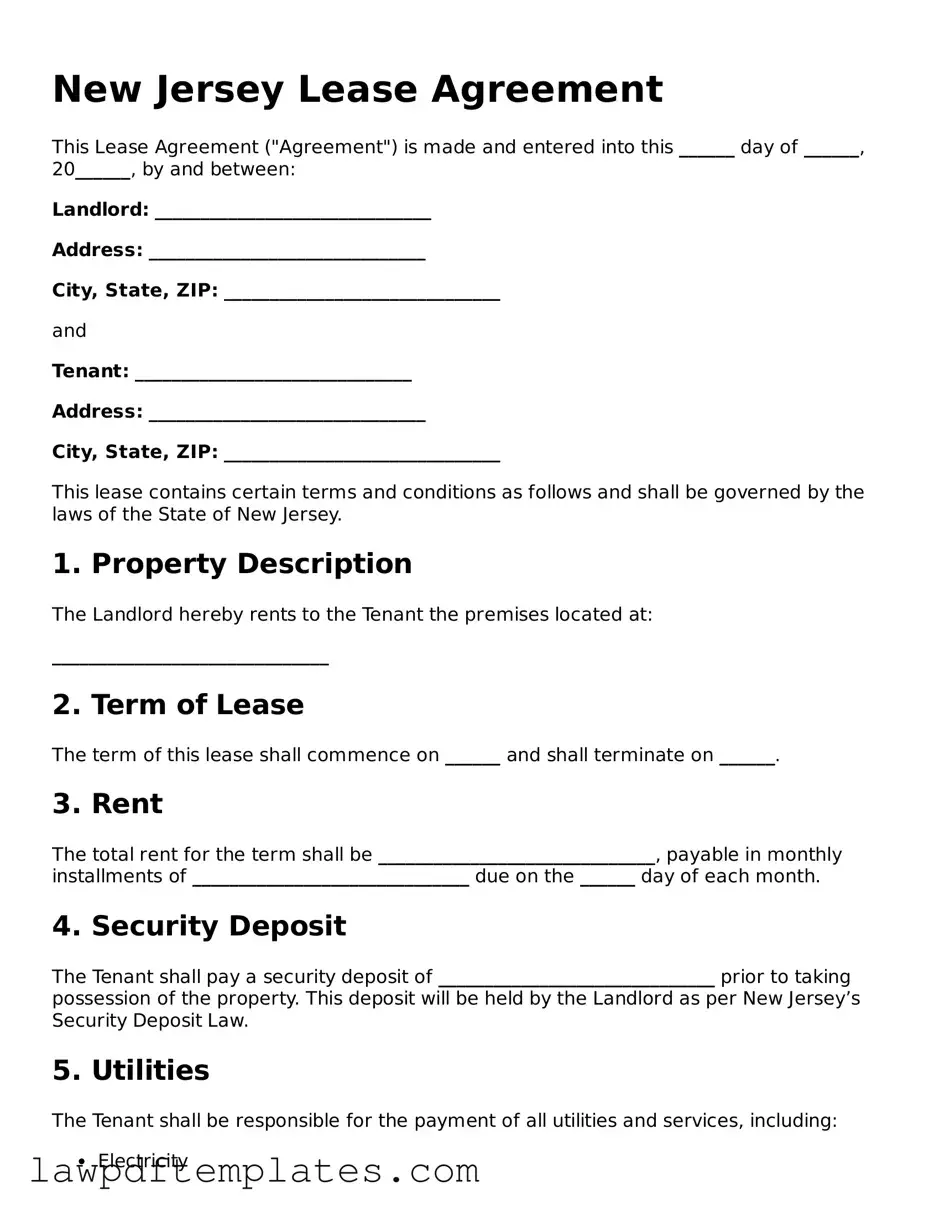Free Lease Agreement Template for the State of New Jersey
Form Breakdown
| Fact Name | Description |
|---|---|
| Governing Law | The New Jersey Lease Agreement is governed by the New Jersey Landlord-Tenant Act. |
| Written Requirement | In New Jersey, leases longer than one year must be in writing to be enforceable. |
| Security Deposit Limit | Landlords can collect a security deposit of up to one and a half months' rent. |
| Disclosure Obligations | Landlords must disclose the presence of lead paint in properties built before 1978. |
| Termination Notice | For month-to-month leases, a 30-day notice is required to terminate the agreement. |
Sample - New Jersey Lease Agreement Form
New Jersey Lease Agreement
This Lease Agreement ("Agreement") is made and entered into this ______ day of ______, 20______, by and between:
Landlord: ______________________________
Address: ______________________________
City, State, ZIP: ______________________________
and
Tenant: ______________________________
Address: ______________________________
City, State, ZIP: ______________________________
This lease contains certain terms and conditions as follows and shall be governed by the laws of the State of New Jersey.
1. Property Description
The Landlord hereby rents to the Tenant the premises located at:
______________________________
2. Term of Lease
The term of this lease shall commence on ______ and shall terminate on ______.
3. Rent
The total rent for the term shall be ______________________________, payable in monthly installments of ______________________________ due on the ______ day of each month.
4. Security Deposit
The Tenant shall pay a security deposit of ______________________________ prior to taking possession of the property. This deposit will be held by the Landlord as per New Jersey’s Security Deposit Law.
5. Utilities
The Tenant shall be responsible for the payment of all utilities and services, including:
- Electricity
- Gas
- Water
- Internet
6. Maintenance and Repairs
The Tenant agrees to maintain the premises in good condition and shall promptly report any maintenance needs to the Landlord.
7. Alterations
The Tenant shall not make any alterations to the premises without the prior written consent of the Landlord.
8. Governing Law
This Agreement shall be construed in accordance with the laws of the State of New Jersey.
9. Signatures
Both parties agree to the terms and conditions set forth in this Agreement and hereby execute this Lease on the date first above written.
Landlord Signature: __________________________ Date: ______________
Tenant Signature: __________________________ Date: ______________
Common mistakes
Filling out a New Jersey Lease Agreement form can be a straightforward process, but many people make common mistakes that can lead to misunderstandings or legal issues later on. One significant error is failing to include all required information. This includes the names of all tenants and landlords, the rental property address, and the lease term. Omitting any of these details can create confusion about who is responsible for what.
Another frequent mistake is not specifying the rent amount clearly. It's crucial to state the exact monthly rent and any additional fees, such as utilities or maintenance costs. If these amounts are not clearly defined, disputes may arise over what is owed each month.
Some individuals overlook the importance of the security deposit clause. New Jersey law has specific rules regarding security deposits, including how much can be collected and how it must be held. Failing to address this can lead to legal complications when the lease ends.
Additionally, people often forget to include the lease duration. A lease should clearly state whether it is a fixed-term lease or a month-to-month agreement. Without this information, tenants may find themselves in a precarious situation regarding their tenancy status.
Another mistake is neglecting to outline the maintenance responsibilities. Both landlords and tenants have obligations regarding property upkeep. Clearly defining these responsibilities in the lease can prevent disputes over who is responsible for repairs.
Some individuals do not read the entire lease before signing. This can lead to unexpected surprises later on. It's essential to understand all terms and conditions, including any penalties for breaking the lease early.
Furthermore, failing to include a clause about the consequences of breaking the lease can be detrimental. This clause should outline what happens if either party fails to meet their obligations, including potential financial penalties or eviction processes.
Lastly, many people forget to keep a copy of the signed lease. Having a copy is vital for both parties to refer back to in case of disputes. Without a copy, it can be challenging to prove what was agreed upon.
Discover More Lease Agreement Templates for Specific States
How Do I Print a Rental Agreement - Defines the duration of the lease and the rental payment schedule.
The Free And Invoice PDF form is a document used to create and send invoices in a standardized format. This form simplifies the billing process for businesses, making it easier to communicate payment details and request funds. By using this form, businesses can maintain professionalism and efficiency in their invoicing procedures, and they can find valuable resources like Fast PDF Templates to enhance their invoicing practices.
Lease Agreement Template Arizona - Sets forth pet policies and any associated fees or restrictions.
Rental Agreement Free Template - Outlines conditions for lease termination and eviction processes.
Free Rental Agreement California - Sets forth any disclosures required by state law.
